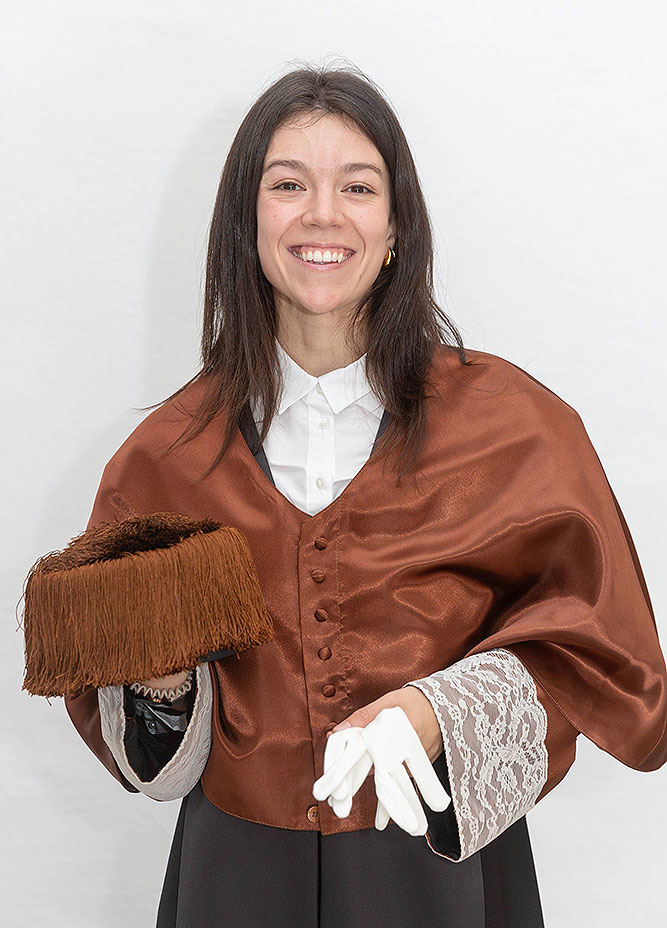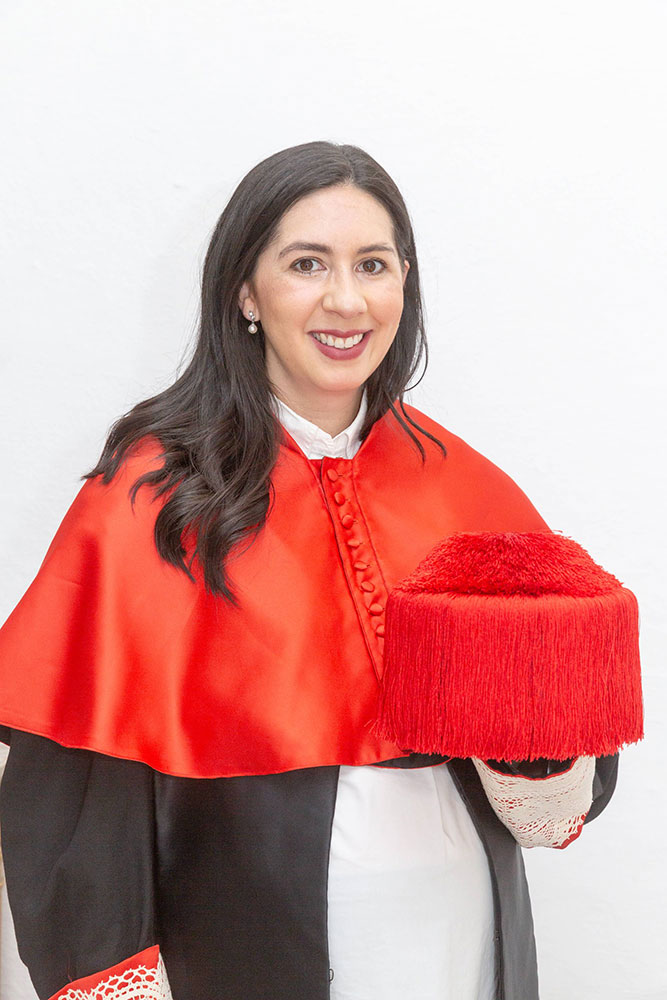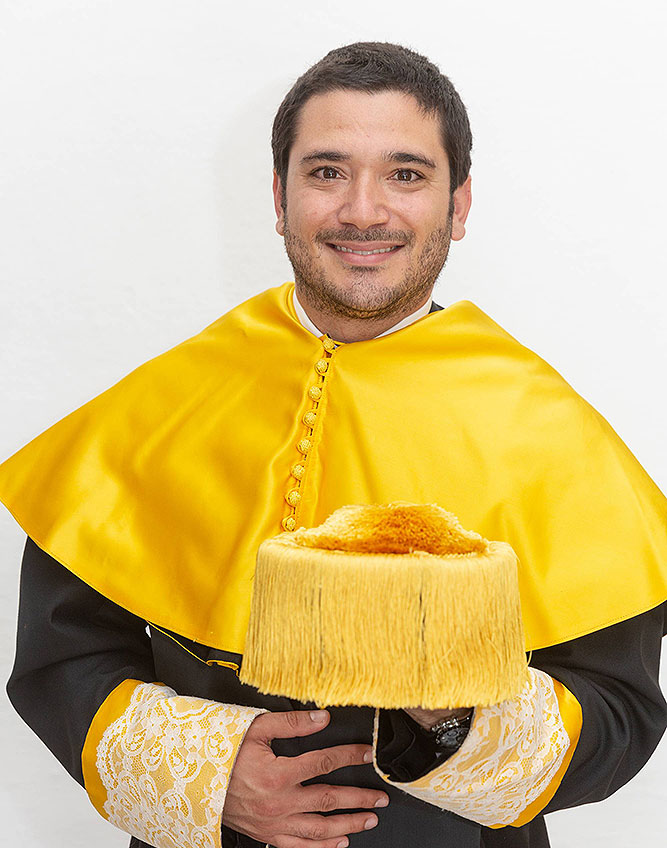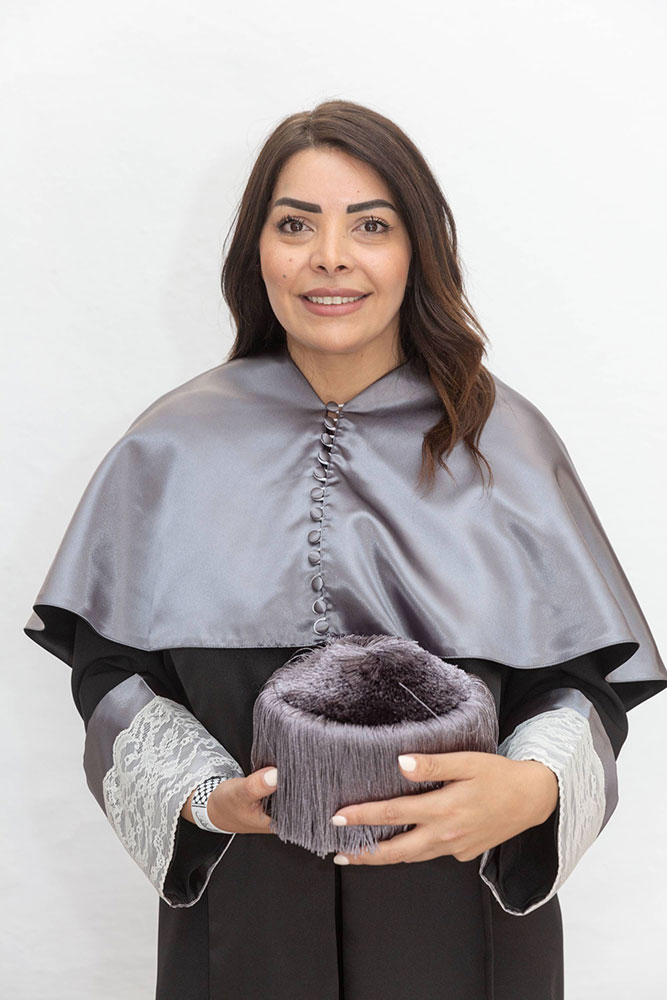From Jordan to Venezuela, Mexico, Vietnam, Nigeria, India or Romania. The University of Navarra celebrated the investiture of 173 new doctors from 34 countries. Doctors who have developed their research in fields as diverse as biosanitary, humanistic, social sciences, engineering, Economics, law, Education or ecclesiastical sciences. A research multidisciplinary and international that dressed with colorful caps the classroom Magna.
"You are 'explorers of truth,'" said president, Maria Iraburu. "The word 'explorer' refers to those characters - Shackleton, Hillary, Livingstone and Stanley and so many others - who surely fascinated us in our childhood. People who set out to climb a cima or map a desert or find the source of a river or test a theory, always driven by the desire to go where no one had gone before," he explained. Regarding the term truth, it is the object of that tireless search: "The research is necessarily specialized and that can make you lose sight of the fact that every truth, however elementary and limited it may be, is part of the singular truth".
According to Professor Iraburu, "we live in a time marked by doubt and skepticism, of falsehoods that are considered with interest and propagated because they shock or excite". The truth, she continued, is more difficult to reach and that is why the explorers of truth, "you are more necessary than ever". "You are needed by society to be able to delve without bias into problems and find just solutions, to create a great network of trust that sustains people and institutions and immunizes them against the risks of deceit and superficiality," he asserted.
Javier Santos García, Full Professor of Tecnun-School of Engineering and sponsor of the graduating class, referred to the new class of PhDs as the "most important in the history of the University of Navarra", since their thesis are framed in a change of era: "The era of artificial intelligence in its multiple versions (text, images, video), where chatGPT has been its spearhead," he said.
"You are not the only promotion that fits this transitional period between eras, but you are the best positioned. A year later, you would have fallen into the temptation to abuse its use, thus losing the opportunity to get the superpower offered to you by doctorate: 'RESEARCH with capital letters'," he stated. A superpower that "will bring you much value wherever you are, whether it is a research center, a business or the university itself" and that in this case, has a nuance to have achieved it in a Christian university, which implies "that you have learned to ask the right questions oriented to the search for truth".
María Lavilla Gracia, PhD in Nursing, read the speech thank you note on behalf of all the researchers and reflected on "the journey" made during these years: "We have overcome great challenges to reach our goals. But, upon reaching goal, we owe a debt to the society that has supported us and allowed us to reach this achievement." In this sense, he thanked the families, directors of thesis and teachers, the University, the association of Friends and the different public or private organizations for their financial aid during this journey.
He also stressed the responsibility of refund to society and to make each of his researches contribute to progress and improve people's lives. "Let us consider how our thesis can contribute to a brighter and more promising future for generations to come. Every question we investigate, every hypothesis we explore and every finding we make has the potential to open new doors and pave the way to a more just, kind, honest, equitable and sustainable world."
In the classroom Magna you could find "explorers" like Fatima, Nabil, Olivia and Ruba, who have designed smart labels to be applied in the field of medicine or food; who are determined to record the factors that affect the relapse of patients with cervical cancer; who focus their research to verify that the right to health is guaranteed to all people or who have spent months of their research to analyze how Jordanians perceive the news.

"I wanted to take my research beyond the University, which will not remain in a article or the development of a product for a business. The research gives you the freedom to think about your project, to see how it can work and the best way to contribute to society", says Fatima Villa, PhD from Tecnun-Escuela de Ingeniería, a native of Bilbao. Fatima is a graduate in Telecommunication Systems Engineering and Master's Degree in Telecommunication Engineering. She has developed her research "halfway" between campus in San Sebastian and stays at MIT in Boston, USA.
With his research, he has managed to design "simple but intelligent" labels, he describes. These labels, without the need for a built-in electronic chip, are able to identify objects but also provide information on other parameters such as humidity, temperature, pH, etc... In this way, their application possibilities are multiplied, and with a bar code they can not only be used to identify clothing, for example, but can also be applied to other fields such as food or biomedicine. Fatima also applied her labels to check whether packaged foods had kept the right temperature for preservation (cold chain) during distribution to supermarkets or to detect cases of diabetes, measuring blood glucose levels with the labels.

After years dedicated to the research to the right to Health by the United Nations committees in the field of Human Rights, the main short-term goal of Olivia Serrano, PhD from School of Law, will be to take care of her baby that will be born in just one month. "After that, I am very much looking forward to returning to the classroom as professor and researcher at the University's International Relations area ," she says.
From Mexico, Olivia Serrano has a degree in International Relations from the Universidad Anahuac (North Mexico). After working for 5 years in an NGO, she came to the University to do the Master's Degree in Human Rights and decided to continue here her research degree program . "In my thesis I seek to answer whether in their work, the UN expert committees are faithful to the principles of universality and intercultural dialogue, which imply that human rights are compatible and applicable to all cultures that are part of the International Community," she explains. "They have been very rich years in training and learning," he assures. And he advises other researchers: "The road is not always easy, but if you know you can make an important impact, it gives you the motivation you need, even in difficult times. It is also important to have colleagues to talk to, because research is not done alone, but in dialogue with other minds, other ideas".

Nabil Manzour Sifontes, doctor of the School of Medicine, says that life led him to know the Clínica Universidad de Navarra. "Because of the prestige of the University and the Clinic, I decided to do my thesis here," says Manzour, graduate from the Universidad de los Andes.
From Venezuela, Manzour has investigated the factors that determine relapse in the treatment of cervical cancer, to find out whether the open approach or minimally invasive surgery determined the patron saint on which patients relapse, i.e., whether they relapse where the tumor was (in the pelvis) or elsewhere in the body.
Led by the Clinic's Luis Chiva, MD, Manzour conducted a study at partnership with 126 centers across Europe and collated the data of 1,156 patients. "My directors at thesis have fathered this project with me and we have fought the publication of each article. For me, the final defense of the thesis was a great moment, exciting, although there are always nerves and it's a bit scary because you don't know what a great expert is going to tell you."

Ruba Mohd arrived in Pamplona accompanied by her husband and her sons, Mustafa and Cady. Without their partnership and support she would not have been able to finish her research, started in 2018 and which has been developed between Navarra and Jordan. The event at classroom Magna marked the end of Ruba's time at the University after years of study.
Ruba Mohd likes to write about people and places. Before starting her research, she was a freelance journalist. Her work led her to publish various articles in media and websites in Jordan, Saudi Arabia and Europe. After that stage he decided to do a doctorate. He chose the University because of its good positioning in the rankings and, as he says, as soon as he arrived, he "fell in love with the green campus of Pamplona". "Professor Javier Serrano supported me all the way, he suggested that I study the patterns of participation in the news and I decided to do a comparative study between Jordan and Saudi Arabia," he adds.
Today, Ruba Mohd teaches at the Middle East University in Jordan. "I thought I wasn't cut out for teaching but now I really enjoy contact with the students," she says. "The research has not been an easy journey, but an exciting one. I have met a lot of people and felt very welcome. In fact, I can say that my favorite part of research has been the time at campus and the university experience.


